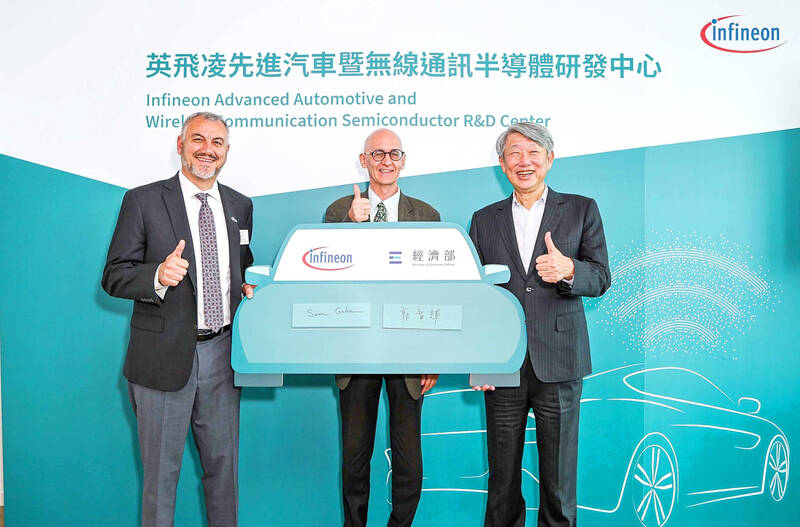《TAIPEI TIMES》Infineon plans NT$1.2bn R&D center

From left, Sam Geha, executive vice president of Infineon Technologies AG’s Internet of Things, compute and wireless business, German Institute Taipei Director-General Jorg Polster and Minister of Economic Affairs J.W. Kuo gesture at an event in Taipei yesterday. Photo courtesy of Infineon Technologies AG
SOLID FOUNDATION: The German firm cited Taiwan’s dynamic innovation ecosystem, such as ‘highly skilled R&D talent and strong industry clusters,’ as reasons for investment
By Lisa Wang / Staff reporter
Infineon Technologies AG, a world-leading automotive chip supplier, yesterday said it plans to set up a NT$1.2 billion (US$37.05 million) research and development (R&D) center in Taiwan with government funding of NT$480 million to develop next-generation Wi-Fi and Bluetooth chips for electric vehicles in collaboration with local partners.
Infineon is the latest among a slew of global semiconductor companies seeking to operate R&D centers in Taiwan given a resilient semiconductor ecosystem. Taiwan Semiconductor Manufacturing Co (TSMC, 台積電) makes advanced automotive chips for Infineon and NXP Semiconductors NV in Taiwan.
Under similar government initiatives, Nvidia Corp has set up its first artificial intelligence (AI) R&D center in Taiwan with total investment of NT$24.3 billion, including NT$6.7 billion in government subsidies, and is considering establishing a second one.
Advanced Micro Devices Inc (AMD) is reportedly seeking government support to build a R&D center in Taiwan with total investment of NT$5 billion.
Infineon’s new investment is part of the “A+ Global Innovation Partnership Initiative Program,” an initiative launched by the Ministry of Economic Affairs to accelerate Taiwan’s development of cutting-edge technologies by leveraging the strength of global industry leaders.
Infineon alone would inject about NT$720 million to establish the “Infineon advanced automotive and wireless communication semiconductor R&D center,” upgrading its existing Wireless Communication R&D Lab in Taiwan.
The R&D center investment, the first among European automotive chip manufacturers, would create NT$60 billion in production value for local automotive electronics, Infineon said in a statement yesterday.
The project would cover the entire R&D process for Infineon’s next-generation, automotive-grade Bluetooth chip that is to be carried out in Taiwan, the statement said.
This includes the involvement of international automotive electronic R&D experts, facilitating exchanges with local researchers and industry clients, and transferring expertise in the automotive domain, the German chipmaker said.
The goal is to complete the entire development process of next-generation Bluetooth chip design in Taiwan, from chip design and production to chip packaging and testing, it said.
“We are impressed by Taiwan’s dynamic innovation ecosystem, including its highly skilled R&D talent and strong industry clusters. Building on our strong foundation of existing partnerships with many Taiwanese companies, Infineon now significantly increases its R&D activities. We look forward to further enriching and broadening our collaborative efforts with our local partners,” Sam Geha, executive vice president of Internet of Things, compute and wireless business at Infineon, said in the statement.
Infineon is to team up with research institutes and technology-savvy schools, including the Industrial Technology Research Institute (工研院), National Taiwan University, National Cheng Kung University and National Taipei University of Technology, as well as multiple Taiwanese network module manufacturers and automotive system developers.
The collaboration is to focus on developing wireless communication technologies such as Wi-Fi and Bluetooth chips and solutions for wireless battery management systems, next-generation smart cockpits, and smart car access systems.
新聞來源:TAIPEI TIMES

















